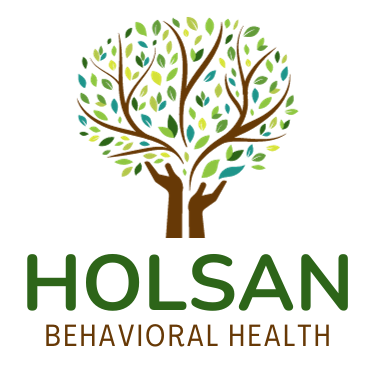Mental health is as intricate as the human brain itself, involving numerous biological, psychological, and social factors. At Holsan Behavioral Health, we understand that providing optimal care means addressing these diverse aspects, which is why we take a holistic approach to mental health care. This method doesn’t focus on one aspect alone but integrates multiple factors to create a well-rounded, personalized care plan for each patient.
What is Holistic Mental Health Care?
Holistic mental health care looks beyond just symptoms. It involves understanding the whole person—their physical health, emotional well-being, social connections, and lifestyle habits. The goal is to recognize how all these factors interact and to address them collectively to promote better overall health.
In holistic care, medication therapy management is a crucial component, but it is complemented by attention to nutrition, physical activity, sleep hygiene, stress management, and mindfulness. Each of these factors plays a significant role in mental well-being, and by addressing them together, patients are more likely to achieve lasting, meaningful results.
The Benefits of an Integrated Approach
The integration of nutrition, exercise, stress management, and mindfulness with medication therapy management offers many benefits:
- Nutrition: Proper diet and nutrition are key in regulating brain function. Nutritional deficiencies, such as low levels of omega-3 fatty acids, vitamin D, and B vitamins, have been linked to mood disorders like depression and anxiety. Ensuring a well-balanced diet can positively impact neurotransmitter activity and overall mood stability.
- Exercise: Regular physical activity has been proven to reduce symptoms of anxiety and depression. Exercise releases endorphins, which are natural mood elevators, and helps regulate sleep patterns—another critical aspect of mental health.
- Stress Management: Chronic stress has detrimental effects on brain chemistry and hormonal balance, exacerbating mental health conditions. Techniques such as mindfulness, meditation, and breathing exercises help in managing stress effectively.
- Medication Therapy Management: For some patients, medication is essential in managing their mental health. Whether it’s balancing neurotransmitters or reducing symptoms of anxiety, depression, or other conditions, medications can create a foundation for better functioning and mental stability.
This multifaceted approach leads to better outcomes because it treats the root causes of mental health issues—not just the symptoms. Addressing a patient’s lifestyle and behavioral patterns alongside their medication management allows for more comprehensive and effective treatment.
Behavioral Health vs. Mental Health
It’s important to clarify the relationship between behavioral health and mental health. Behavioral health focuses on how behavior impacts a person’s well-being. Often, maladaptive behaviors—such as substance use, poor sleep, or unhealthy coping mechanisms—can contribute to mental health issues. In these cases, addressing behavior through therapy or lifestyle changes can improve mental health outcomes.
However, some mental health conditions are not rooted in behavior but are largely influenced by genetics and brain chemistry. Conditions like bipolar disorder, schizophrenia, and major depressive disorder may not stem from specific behavioral patterns but from imbalances in neurotransmitters, genetic predispositions, or abnormal brain structures. For these conditions, medication management plays a critical role in restoring balance and improving quality of life.
Holsan’s Holistic Approach to Patient Care
At Holsan Behavioral Health, our focus is on providing high-quality, evidence-based medication management. While we do not offer psychotherapy independently, we do integrate behavioral health strategies into our medication management plans to ensure that patients receive comprehensive care.

Our treatment framework revolves around the 7 R’s to provide the best care possible:
- Review: We conduct thorough reviews of each patient’s medical and mental health history.
- Regulate: Our goal is to regulate brain chemistry through carefully managed medication.
- Refer: We refer patients to trusted therapists when they require psychotherapy, collaborating with a network of mental health professionals.
- Recommend: We recommend lifestyle changes like exercise, nutrition, and stress management techniques.
- Reinforce: We reinforce healthy behaviors through medication adherence and follow-up appointments.
- Respond: We adjust treatment plans based on patient feedback and progress.
- Restore: Our ultimate aim is to restore balance and improve the patient’s overall quality of life.
We work closely with primary care providers, therapists, and other healthcare professionals to ensure that every patient receives the comprehensive care they need. When it comes to mental health, collaboration between various healthcare providers can make a significant difference in treatment outcomes.
Combining Therapies for Optimal Outcomes
When mental health conditions are approached with both medication management and behavioral support, the outcomes are often much better than relying on one method alone. For example, medication may alleviate the biological factors contributing to anxiety, but therapy can help a patient develop healthy coping mechanisms. Similarly, improving a patient’s physical health through proper nutrition and exercise can enhance their mental well-being.
Holistic care, which combines lifestyle changes with medication and behavioral strategies, provides the best chance of success. Patients who are actively involved in their care—by participating in stress management activities, engaging in regular physical activity, and adhering to medication plans—are more likely to experience improvements in mood, behavior, and overall functioning.
Conclusion: A Whole-Person Approach
At Holsan Behavioral Health, we believe that holistic mental health care is not only effective but essential. By addressing the mind, body, and behavior together, we help our patients achieve more sustainable, long-term recovery. Our medication management services are part of a broader treatment plan that includes collaboration with therapists, primary care providers, and other healthcare professionals to support the whole person, not just the symptoms.
If you’re looking for a comprehensive approach to mental health care that integrates medication management with lifestyle and behavioral health strategies, we’re here to help. Reach out to us today to start your journey to better mental health.

